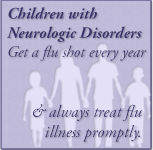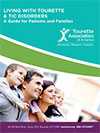Information For Families

This section of our website has tips and information about Tourette Syndrome (TS) for families. If you or your child has TS, it can be challenging. Following are some tips to help you in dealing with this condition, whether it affects you or your child.
Be An Advocate for Yourself or Your Child
Taking an active role in managing TS can be helpful in advocating for yourself or your child. To make important decisions, you need to know about TS, understand treatment and management options, and then make the best possible choices for your health or the health of your child.
- Talk to a health care provider about any questions or concerns.
- Learn as much as you can about TS. You can start by reading our pages on the following topics:
- Ask your provider about concerns and symptoms beyond tics. 86% of children with TS also have been diagnosed with at least one additional mental, behavioral, or developmental condition and these conditions often add to stress and difficulty in managing health care. Many children with TS also experience learning difficulties. Getting proper treatment and coordinated care is very important.
- Visit the website of the Tourette Association of America to find information, resources, newsletters, videos, and more. In addition, the Tourette Association can be helpful with finding local healthcare providers.
Find Support
Having support and community resources can help increase your confidence or that of your child in managing TS, enhance quality of life, and assist in meeting the needs of other family members. Parenting is often challenging, and parenting a child with a chronic condition like TS can add additional stress to the day-to-day challenges. If you are the parent of a child with TS, it might be helpful to talk with other parents who have a child with the same condition. Other parents probably have learned how to manage some of the same concerns you have. Often, they can give advice about good resources to help you meet your child’s needs. Similarly, if you are an adult with TS, talking to other adults with TS might be helpful.
Remember that the choices for another family might not be best for your family, so it’s important to understand all options and discuss them with your health care providers.
- Your local Tourette Association chapter can help you connect with other families through conferences, support groups and other events.
- Parent-to-Parent Programs provide information and emotional support to families of children who have special needs.
Voices of Tourette Syndrome
Read about some people’s experiences living with TS.
Educate Others
One way to help someone with TS with school, work, and other activities is to educate people about TS. When people know more about the disorder, they might be more understanding, helpful, and accommodating. For example, an employer might be willing to rearrange desk seating to provide more privacy. Or, a sports coach might encourage teammates to ignore a child’s tics instead of teasing the child.
For more information, you can visit the following websites:
Educating Peers About Tourette Syndrome
Kid’s Quest
Get kids to think about people with TS and some of the issues related to daily activities, health, and accessibility.
Tourette Syndrome Youth Ambassador Program
Use School Resources
TS can affect a child’s experience at school. For example, some tics make it difficult to read or write. Or, a child might get distracted by tics or trying to not have a tic. In addition, because many people do not understand TS, children are sometimes teased, bullied, or rejected by other kids. However, with some planning, children with TS can have a positive, successful school experience.
Generally, children with TS have the same intelligence range as other children. But problems with tics, often combined with attention deficits and other learning difficulties, can mean that children with TS will need special education assistance. Examples of this type of assistance might include a different seating arrangements, additional time for testing or computer accommodations for children who have problems with writing.

If you are the parent of a child with TS, you can help by creating a special plan for school. Such plans—called 504 plans—are written each year by a committee that includes parents and teachers. A 504 plan lists your child’s disability and how the school can help. This plan is updated once a year.
A different plan—an individualized education plan (IEP)—is needed for children taking special education classes. An IEP is a legal document that tells the school what it must do to help meet your child’s needs.
For more information, please visit the following websites:
Education and Education Strategies
Tips on Dealing With Tics in the Classroom
The Difference Between IEP and 504 Plans
IEP Plan: Information for Parents
Prevent Bullying
Children with TS and related co-occurring conditions (such as attention-deficit/hyperactivity disorder (ADHD)) are often victims of bullying by their peers. These children might be more of a target because they often stand out from other children, and their tics, obsessions, compulsions, or hyperactivity single them out from their peers.1
Children with tics are more likely to be bullied than children without tics, and those with more severe tics are at greater risk for being bullied. Among children with tics, bullying has been associated with loneliness and anxiety.2
References
- Great Ormond Street Hospital for Children NHS Trust [Internet]. London; February 2007 [cited 2010 June 23]. Tourette Syndrome and bullying at school.
- Storch, EA, Chase, RM, Keeley, M, Goodman, WK, Murray, M, Geffken, GR. Peer victimization in youth with Tourette’s Syndrome and chronic tic disorder: Relations with tic severity and internalizing symptoms. Journal of Psychopathology and Behavioral Assessment. 2007; 29(4): 211-9.
- Page last reviewed: May 11, 2017
- Page last updated: December 7, 2016
- Content source:



 ShareCompartir
ShareCompartir

